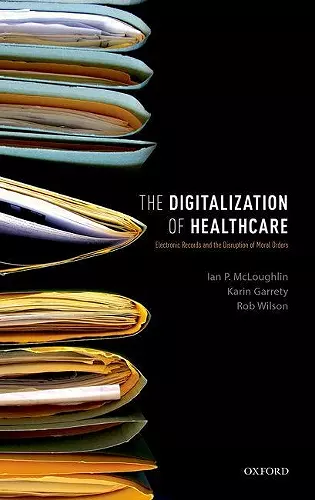The Digitalization of Healthcare
Electronic Records and the Disruption of Moral Orders
Rob Wilson author Ian P McLoughlin author Karin Garrety author
Format:Hardback
Publisher:Oxford University Press
Published:2nd Feb '17
Currently unavailable, and unfortunately no date known when it will be back

Electronic health records are widely regarded as the 'connective tissue' of any modern healthcare system. For some they represent a 'dangerous enthusiasm' and for others a key enabler of 'disruptive innovation'. Many governments have made major policy and financial investments in digitalizing health records but their implementation has frequently run into opposition from doctors, had lukewarm responses from patients, and raised considerable concerns for privacy advocates and others worried by the security of sensitive health data and the risks of national data-bases. This book draws upon the concept of 'orders of worth' to reveal the moral dimensions of the medical division of labour and to delve deeper into understanding why electronic records have been so difficult to implement and the sources of opposition to them. The authors argue that digitalization disrupts the moral orders which define rights and responsibilities for the sharing and exchanging of patient medical data. This is illustrated through longitudinal studies of two of the most controversial attempts to introduce national systems - a patient controlled electronic record in Australia and a national summary care record that was part of the ill-fated NHS national program for IT in England. The authors conclude by using the lessons from these national experiences and insights from two regional projects in each country to suggest how the idea of electronic records might be re-thought. It is a must read for anyone concerned about health information and the implications of how it is shared and exchanged in a digital world.
The strength of this book is that it combines the development of theory with the detailed analysis of richly-described case studies. The authors base much of the book around the work of Everett Hughes on moral ordersthat is, in relation to professional practice. The challenges of moral orders in a digitized health service can be understood only on a case by case basis using thick description and narrative analysis. It follows that what the reader will get from this book is an enriched understanding of the complexities of attempting to digitize professional practice. * Trish Greenhalgh, Professor of Primary Care Health Sciences, University of Oxford *
This book provides a rich set of insights and deep understanding of the complexities faced by those attempting to develop and implement national shared electronic health systems. As someone who has observed such attempts for over 20 years, the sagas recounted are both rich and full, and read to me much like a very familiar 'guide-book to the town of my birth'. The analysis of the progress and fate of the efforts in both Australia and the U.K. offers valuable insights as to what has made progress so difficult and explains why such national projects may not ever fully deliver what is expected, without clarity being developed as to just what the purpose of the project is and what can realistically be achieved. * Dr David G. More, MB PhD E-Health Analyst and Blogger *
This important book explores the transition from paper-based to digital health with academic rigor, yet in an easy-to-read style. It describes today's complex and often painful path to computerization, and places the evolution in the broader context of the clinical, ethical, economic, and political forces that are challenging healthcare systems everywhere. Highly recommended! * Robert M. Wachter, MDChair, Department of Medicine, University of California *
That the digital revolution disrupts healthcare is not in question. Whether that disruption is always for the good of all is however quite a different question. This book is for those who want to gain insight into this question as it is these questions of moralities and the disruptive effects that they have on local developments and national programmes that is at the heart of this book. * Enrico Coiera, Professor and Director, Centre for Health Informatics, Australian Institute of Health Innovation, Macquarie University *
ISBN: 9780198744139
Dimensions: 241mm x 182mm x 19mm
Weight: 472g
212 pages